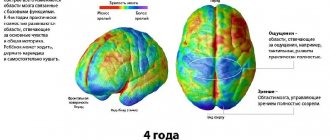Lately, it is quite common to hear the combination of the words “integral personality.” People talk about wanting to become a whole person. But does everyone fully understand what exactly this expression means and is there any understanding of how to truly become whole?
Personal integrity is a fairly broad concept. Many factors and aspects characterize such a person. Let's try to give a generalized concept.
A holistic personality (from a psychological point of view) is a person’s ability to have a clear core within himself, thanks to which he manages to remain true to his beliefs in every situation, relying only on his true desires and needs. And do this not because it is necessary, but because you feel and want to, experiencing harmony and calm.
In this article:
The main characteristics of an integral person Why is a person capable of losing his integrity? Signs of incompleteness of his “I” How to gain or regain his integrity?
A holistic personality. Description
And someone who is firmly confident in himself, knows what he wants, and accepts everything around him as it is, and does not try to resist fate, can call himself such a special person. A person respects everyone’s choice, including his own. We can say about such a person that she looks at things with a realistic look and draws appropriate conclusions, even if they contradict external pressure. This is a person whose inner world is harmonious with the outer. Self-confidence and peace of mind accompany him in life.
Material and spiritual flows are in balance with each other. When a personality is holistic, it is guided by its own internal compass—truth. Man is part of the Universe and feels unity with the world. It is filled with vital energy. He shows interest in the world, realizes his talents and activates his internal resources. The personality is filled with vital energy thanks to energy channels.
Basic Characteristics of a Whole Person
Photo by cottonbro: Pexels
- Self-love and self-respect.
This is not about narcissism, but about healthy self-love. When a person is a support, and not looking for someone to lean on. Respect for your desires and needs. Acceptance of all strengths and weaknesses.
- Respect for other people.
This is not about trying to please others and indulging them in every possible way. It is important to be able to act without violating the boundaries of another person, respecting his wishes. The ability to care for others without harming yourself or them. Developed sense of empathy.
- Inner peace.
A holistic person, even if he experiences anxiety and negative emotions, is able to find balance and cope with every difficulty. To do this, he does not have to expend a lot of energy. For him, a harmonious state is a necessary component of his personality.
- Adequate self-esteem.
A clear understanding of one’s value helps a person to give himself a worthy assessment (of his qualities, appearance, inner content).
- A realistic view of the world around you.
The ability to see the whole picture, not getting hung up on little things, the ability to isolate what is necessary and important.
- Your own clear position and opinion on any situation.
Opinion does not change under the influence of certain factors (surrounding people, circumstances). A person calmly expresses his thoughts and is confident that he is right, because this is his clear, unshakable position, based only on his convictions.
- Lack of internal conflict.
An integral person also does not rely in his actions on the opinions of others or any norms of society. He is able to allow himself to do as he wants.
- Natural behavior.
The person behaves at ease and easily, and is calm in communicating with any person. Not withdrawn and not uncomfortable. A holistic person is so harmonious that he attracts others like a magnet.
- The ability to manage your energy.
The ability to not waste your time and energy. All this comes from a clear understanding of your needs and goals.
- Feeling of safety in the outside world.
For a holistic person, complete trust in the world and circumstances is important. He knows the fact that everything that happens to him is the best scenario specifically for his life. He is safe and calm in any conditions.
Education
The holistic formation of the individual occurs due to the fact that a clear awareness of everything that is happening comes. Each lesson brings something necessary for development into a person’s life. This person also allows herself to experience any emotions and accepts everything, even the dark sides of her character, with the confidence that all this will teach her something. Such people know how to enjoy every moment in life, feel inner freedom, as they look at the world from the position of God. And we can say with firm confidence that these individuals lack excitement and experience.
Opportunities open up for them for constant development, learning everything new, and life itself becomes a great adventure. A person emits energy such as joy, warmth and light into the outside world. He wants to share all this with the surrounding society.
When does formation begin?
The formation of a holistic personality occurs only when a person thinks that something in life does not suit him. This also happens if an inner voice tells him that he is going down the wrong path. Perhaps a person does not even suspect that it is a matter of integrity and that he should pay attention to his inner world.
Often such a person does not take into account all the components of his essence, mainly only his appearance, character or physical form. At the same time, she forgets that a person is a combination of mental, energetic and physical processes.
Defense Mechanisms
First of all, the holistic personality is considered from the perspective of such a science as psychology. Here the person herself is the main object of study in this area. The personality is considered from the social side, its behavior in society, the presence of individual properties and character traits. It is formed under certain beliefs and principles realized by the person himself. Holistic personality psychology implies a certain defensive reaction. There are several such mechanisms in nature, and they are triggered when something threatens a person. Some personality traits can be classified as a defensive reaction, such as:
- substitution, when aggression received from someone on an individual is transferred automatically from her to another person;
- repression - a person forbids himself to perceive those thoughts and feelings that caused suffering, forgetting or not knowing that all this remains in the subconscious, which is not good for her;
- projection - when one imposes his irrational thoughts on another or several people, thus shifting his shortcomings or shortcomings onto others.
A person personally chooses and adheres to them. Thanks to integrity, he gains psychological stability at a high level when there is a choice between achieving goals and proposed values. Not everyone is given the status of a complete person. It all depends on the characteristics of upbringing, on the relationships in the family where a person grew up, on interaction with the environment and on its influence. People are not born with a complete personality. Its formation depends on the interaction and influence of the external environment.
What are "chakras"
So, chakras are the main elements of the human energy system; translated from Sanskrit they mean “wheel”. In ancient Eastern traditions, this word is used to describe spinning energy points located throughout the body. There are thousands of chakras from the tips of your fingers to the tips of your toes. However, there are seven main ones (and these are the most famous) that go from the base of the spine to the top of the head. They are what is meant when they talk about energy centers. In order to understand how to change ourselves, it is important to know their main functions and their impact on our lives.
The energy from these centers nourishes the entire body with Divine (vital) energy (prana, qi). According to some esotericists, all living things have chakras, not only people, since in the physical world everything consists of matter, and matter, in turn, is made of energy.
The flow of energy entering and exiting the chakras activates the body's meridians (or the energetic flow of the blood) and directly supplies the body's organs, tissues, muscles and cells with energy. Toxins that are formed in the body due to physical and emotional processes can clog the chakras, then the energy of the corresponding organ or emotion is blocked. How can you change yourself with this information? It is necessary to maintain the cleanliness of the respective centers, which play an important role in ensuring optimal physical and mental health.
As we see, the interaction of energy, physical and mental health and human condition have direct and inverse connections. By influencing energy, we influence the body and emotions, taking care of the body and our emotions, regulating thoughts - we improve energy.
Asking questions about what integrity is and how to achieve it, we recommend considering a person and studying yourself and your personality not only from the point of view of psychology, but also from the point of view of the unity of man as an energetic entity with the energy of the Universe. The parable that the flapping of a butterfly's wing in one part of the world can cause an earthquake in another has not only a figurative, but also a deep esoteric meaning, speaking about the unity of all processes and all living things.
People often feel small and have no influence on anything in their lives, victims of circumstances, other people, and certain forces beyond their control. However, people underestimate the power of thought and the power of intention, which are integral parts of a complete personality.
By gaining an understanding of integrity, a person gains an understanding of his own importance and the ability to manage his life.
(Article written using content from Dr. Kirsten Nagy of naturalwellnessgirl.com)
Power model of development
Personality can develop according to two models: strength and the model of internal harmony. In the first case, beliefs are rigid, and they are defended in open conflict. Moreover, the person is not going to “give up his position.” As a result, the personality breaks down entirely, which cannot be said about the harmony model. Where there are not only beliefs, but also morals and spiritual values. A person is ready to sacrifice himself and his life to his beliefs.
The power model can be attributed more to a man. It is not easy for him to accept external laws and demands with control. Although the main thing for him is to agree with them. After this happens, the man monitors all this himself. He came to this.
Reasons for the development of the disease
Experts in the field of psychiatry put forward two main theories of the formation of the disorder. According to the first, the disorder develops due to heredity. The opposite opinion is that pathology is the result of the unfavorable influence of the environment on the formation of personality from an early age. This concept includes a lack of love from a significant adult, excessive care or neglect.
Most specialists take an intermediate position. They believe that the prerequisites for the development of pathology were formed as a result of the interaction of internal and external factors. In patients with schizophrenia, oligophrenia and other mental disorders, the likelihood of developing dissocial personality disorder is very high.
Model of internal harmony
A holistic personality, located in a model of internal harmony, is also supported by internal flexibility. That is, when a person safely accepts the environment as it is, and it accepts him.
The presence of harmony within can be defined as the absence of conflict between the internal parts of the personality, as well as only a positive worldview. A person realizes and accepts that understanding others and oneself should come first. Moreover, he himself strives to notice only the strong and positive sides. Such people do not engage in self-accusation. Internal flexibility helps to adapt for some time to the harsh demands of the external environment, allowing you to use every opportunity to return to your original state. This model is mainly typical for the fair sex.
Unintegrated personality. Description
If a person does not have goals, constantly contradicts both everyone and himself, does not know how to make decisions, or shifts them to others so as not to bear responsibility for them, then such a person can hardly be called holistic. For these people there is no guideline in life; their companions are self-doubt and low self-esteem. The consequences of all this are a constant change of personal beliefs and disappointment in everything.
Why is this happening? Perhaps upbringing or the surrounding society played a role here, which introduced limits. Or maybe situations that caused pain and influenced a person’s rejection of himself. Then the feelings are prohibited in order to avoid suffering in the future. The connection with the soul is lost, and the mind takes responsibility. Surely many have been in a situation where betrayal, disappointment, stress or severe grief led to a loss of integrity.
But not everyone, being in critical conditions, retains their qualities as an integral personality and remains unchanged in relation to their life positions. It all depends on the temperament and type of person. A person who does not want to recognize her talents, wants to be successful, but does not take any steps for this, sees only shortcomings in herself and in others, experiences self-hatred to a greater extent than love, the definition of “integrated personality” is not suitable. A holistic person understands his purpose. He follows inner guidance in a given situation.
Signs of incompleteness of one’s “I”
You can determine that you have lost your integrity by the following signs:
- You don't have enough energy
- The opinions of other people have become important to you
- You no longer feel supported in yourself
- You demand care and support from others
- Don't understand where to move next
- You have a lot of doubts
- Distrust of the world
- Difficult to make a decision
- Reluctance to take time for yourself
- No desire to develop and grow
- Feeling irritated
- Difficulties in relationships with people
- There is a desire to close
- Sometimes there is anxiety inside
Tips for Finding Wholeness
A person who is not in integrity cannot see his true state, it is difficult for him to do this. To do this, you need to look into the soul, ask yourself about what is needed for the holistic development of the individual to come into his life.
Restore connection with your inner world, open to the light and all positive energies. You need to strive for this and sincerely want it. When a person establishes contact with his soul, the necessary circumstances, bright people and opportunities come into his life. The main thing is to notice all this and be grateful for everything. Usually a teacher or mentor comes into life and brings him to the level of awareness.
When everything that comes into life is accepted as something that was planned by the soul, as some kind of experience or game, then unity with the world is restored. Cleaning the subtle bodies and working with all internal blocks will help you achieve a complete revival of integrity. The highest source of energy will bring all aspects into harmony with each other using powerful vibrations into a single whole. You can also reach this state in a different way.
A person must express himself in creativity. Accepting responsibility for your life, trusting the world and turning attention inward - this will also help restore a person’s integrity. The readiness and desire to feel this state must be present. Do not contradict anything or anyone. Everything should happen easily and naturally. Meditation and proper breathing will help you achieve unity. Afterwards, the person himself will be able to freely enter the common flow with higher energies. Entering a state of integrity has no boundaries; a process of unification with the Universe, nature and the right energies occurs.
Human integrity. The path inside yourself
If you have found joy that does not leave you;
if circumstances change, but she remains, it means you are approaching the state of Osho
Most people who have embarked on the path of self-improvement have come across the concept of Human Integrity as the main thing that needs to be achieved in working on oneself. This concept, just like the concept of awareness, has become so familiar to our minds that it skims through it without thinking, as if it were a matter of course. But if we look around and be honest with ourselves, how many people will we find with integrity? How many of us know exactly what they want from life, from themselves, and if they do, what is the likelihood that these are actually our desires and goals, and not those imposed on us by someone? Is it really so obvious what the principle of human integrity is? And why is acquiring this quality so vitally important and yet so rare?
For quite a long time, the problem of human integrity has been the subject of my research and close interest, so now I want to share some thoughts on this matter.
Firstly, no matter how trivial it may sound, you need to admit to yourself that this quality does not yet exist. It is very important to observe yourself and see what interferes with this and what is not integrity. And here is the first practice: observe your multiplicity, your mood changes depending on external circumstances; track desires that can be very contradictory; reconsider goals that may be alien. At the same time, it is important to ask yourself the question: “Who (what) in me now wants to do this, think, act?” The second question is: “Why should I think, do, desire this?”
That is, the first step is to see how things really are. This is the collection of strategic information. At the same time, you cannot condemn yourself and become dramatic about your imperfections. This is a strong hindrance and an attempt by the Ego to lead us away from our true goal. Therefore, we simply observe and collect data for further work. It might look something like this: “I know that eating refined food is harmful, but I do it anyway - it’s not integrity. Today I am in a good mood because I was praised, and tomorrow I am in a bad mood because I was offended - this is not integrity. Today I want to meditate in the mountains, and tomorrow I want to build a successful career - this is not integrity.” And so on. Seeing your inconsistency and collecting as much evidence about it as possible is already a good half on the path to finding your true self.
Secondly, you need to study your device. What is our composition? What is human integrity? Spirit – soul – body. What are the needs of the body, what are the needs of the soul and spirit? Upon closer examination, it will become clear to us that these are completely different needs, and often opposite to each other. This must be taken into account when working on yourself and be able to correctly set priorities without infringing on any of our sides. At this stage, we are trying to understand what spiritual-physical integrity is, which characterizes an individual as a conscious person. We also have certain centers that perform certain functions. There are higher centers and there are lower ones. Everyone should mind their own business and not interfere with the work of others. As for needs, a holistic person has everything in harmony. There is no neglect of body and soul for the sake of spirit or vice versa.
If we trace this through the example of yoga, we will see a very healthy approach and systematic approach to self-development. The necessary attention is paid to such a necessary thing as the physical integrity of a person, that is, the body. It must be healthy, strong and resilient. For this, proper nutrition, asana complexes and cleansing have been developed.
The spiritual integrity of a person is compliance with the moral laws by which the Universe is structured.
In this case – yama and niyama. By honoring and fulfilling these laws, the Soul blossoms and develops, feels joy and fullness, and also becomes able to recognize the integrity of the external world. For the mind in yoga, concentration and meditation. This brings the restless and tossing mind into balance and allows it to perform its true function. As for the centers, or chakras in another way, they must also be harmoniously developed. Moreover, the emphasis is needed on the development of the lower centers, since the higher ones are already developed. It is in this sense that we are all initially perfect.
What is wrong with our lower centers? This topic is quite extensive, so I will limit myself to some basic provisions. All processes occurring in us are material, the only difference is in the subtlety of matter. There is gross matter and there is subtle matter. In order for everything to function, we need energy, which our body produces every day. The task of the lower centers is to work on their energy, without wasting it in vain, saving it for transformation from gross to subtle, which will then properly connect the lower centers with the higher ones. At this stage, we also need to first find out where and how the energy we need so much is spent. Because if it is depleted, the level of consciousness also drops and work on oneself becomes impossible. In this case, a rollback occurs: bad habits return, the daily routine gets disrupted, and the character “spoils.” And this indicates precisely a low energy level. And also that the integrity of a person is revealed through consciousness.
By observing ourselves, we can find out that energy often flows away due to the habit of a bad mood and anxiety. It is also spent on all sorts of fears, doubts, suspiciousness, irritation - any of these emotions, having reached a certain intensity, can destroy the lion's share of the energy accumulated before. A lot of energy is wasted on morbid imagination and mental chatter, on unnecessary muscle tension. We don’t know how to relax and even sleep with tense muscles. Some people need several hours at night just for their body to relax. If you approach this consciously, you can do it much faster, using, for example, consistent relaxation of all parts of the body before going to bed, as in shavasana.
And only after the necessary material has been collected in the process of observing oneself, it will be possible to begin to change something! This is an extremely important point. At the stage of observing ourselves, our multiplicity will be revealed. We will discover that we do not have a permanent “I” that is able to control everything, make consistent decisions, have constant goals and take responsibility for our actions. Rather, one will see a succession of different small “I”s, each of which arrogates to itself the meaning of the whole and destroys the integrity of the person. I consider this point to be the most important. It is absolutely necessary to see this within yourself, otherwise no development and preservation of integrity will be possible. The point is that people usually don't notice this multiplicity. It seems that this is just a change of mood or lack of will, but I myself am the same, still the same. This is because we always live in the final self. The change of different “I” is caused by external influences (for example, good weather brings to the surface one group of “I”, and bad weather – a completely different one, therefore the state changes), upbringing, social pressure, reading, religion. As a result, some groups of “I” may be stronger than others, but until this is realized, they will act automatically.
What does this look like in real life? The simplest example: you made a promise to yourself to start eating right tomorrow. This will be the decision of one “I”, the next day or a few days later another “I”, completely unaware of the previous one, will eat some goodies, and you will have to deal with the consequences. In the worst case, some vain “I” in you may promise something to someone out of a desire to show off, then it disappears, and the person, that is, a combination of other “I”s, is forced to pay for it.
Here it is appropriate to cite one Eastern parable that well illustrates this nature of ours. In it, the missing integrity of a person is compared to a house where there is neither owner nor manager, but only a crowd of servants who have forgotten their duties. No one wants to do their own thing, but everyone tries, at least for a moment, to take the place of the owner and give orders. In such a situation, the house is in serious danger. And the opportunity for salvation for the rest of the more intelligent servants is to choose from among themselves a temporary manager who will force everyone to do their job. He will send the coachman to the stables, the cook to the kitchen, the gardener to the garden, and so on. In this way, you can prepare the house for the arrival of the real manager, and then the owner. This very deep parable is found in many Eastern teachings and in the Gospel texts, in different variations. Just being able to see this all in yourself is a powerful practice to begin to build personal integrity, and is also half the battle. This is what the ancients meant when they said: “Know yourself!”
The second half will be a deep awareness of our situation, in fact we will see ourselves in a kind of prison, and then the formation of a firm determination to free ourselves. This firm determination will form a group of “I”s that will become the temporary manager, and further work in this direction will give the opportunity for the real master to emerge. Each of us who wants to be a complete person, and this means a person who knows exactly what he wants and is able to achieve it; whose goals do not contradict the laws of the Universe; who is able to be in harmony with himself and others; who is able to realize the integrity of the world and is happy because of it, can master this path.
Our helpers on this path will be a harmonious development system, in my case it is yoga, which develops the integrity of the whole organism; self-observation and awareness of one’s multiplicity; a group of like-minded people for mutual help and support, especially in difficult moments; ideally a teacher or mentor who understands these issues. In the absence of one, relevant literature on this topic.
To summarize the above, I will list the necessary first steps on the path to achieving integrity:
- Consistently observing yourself and trying to be conscious in your observations, to see the real state of affairs within yourself;
- Reconsider your goals and desires in terms of “your own and others’’. They can be imposed on us by parents, loved ones and significant others, by society, especially in the sphere of consumption. We often do not realize our real needs, but we chase after artificially created and absolutely necessary ones presented to us with the help of fiction, films and advertising;
- Then, having seen what our prison consists of and where vital energy is spent, we will be able to save this energy for our development and at the same time plan an escape plan. At this stage, like-minded people and escape cards are especially useful, that is, the necessary knowledge about our structure, laid out in some kind of harmonious system that concerns the whole person (spirit, soul, body).
By eliminating the multiplicity within ourselves step by step, we begin to understand what the integrity of human life is, and as a result we become Masters in our own kingdom. And the one who was able to become a master in small things can already be entrusted with something bigger. But this is a separate topic.











